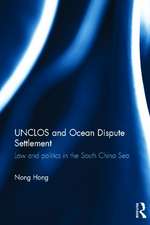Marine Mammal Conservation and the Law of the Sea
Autor Cameron S. G. Jefferiesen Limba Engleză Hardback – 22 sep 2016
Preț: 719.40 lei
Preț vechi: 1030.52 lei
-30% Nou
Puncte Express: 1079
Preț estimativ în valută:
137.65€ • 143.72$ • 113.93£
137.65€ • 143.72$ • 113.93£
Carte tipărită la comandă
Livrare economică 25-31 martie
Preluare comenzi: 021 569.72.76
Specificații
ISBN-13: 9780190493141
ISBN-10: 0190493143
Pagini: 418
Dimensiuni: 155 x 231 x 33 mm
Greutate: 0.75 kg
Editura: Oxford University Press
Colecția OUP USA
Locul publicării:New York, United States
ISBN-10: 0190493143
Pagini: 418
Dimensiuni: 155 x 231 x 33 mm
Greutate: 0.75 kg
Editura: Oxford University Press
Colecția OUP USA
Locul publicării:New York, United States
Recenzii
Marine Mammal Conservation and the Law of the Sea provides a timely re-examination of the regulation of marine mammals and proffers a series of informed and helpful proposals for reform. There is much to admire in the proposed new regulator and Jefferies provides an array of well-considered solutions to some of the thornier problems afflicting the IWC in particular. ... Jefferies has a deeply engaging style and presents an enormous amount of legal and scientific information in a clear and compelling manner, and the book itself is a very enjoyable read. ... the international community will find much of value in Cameron Jefferies's excellent account of the core issues at stake.
Dr. Jefferies' excellent book, Marine Mammal Conservation and the Law of the Sea, fills an important need in the scholarly literature by providing a thorough and well-researched analysis of international law's treatment of marine mammal protection. The book has three primary strengths. First, it offers a comprehensive review and assessment of existing international law protections for marine mammals. Second, it examines critical ethical dimensions of marine mammal conservation, highlighting important issues at the intersection of environmental law and animal welfare law. Third, it provides valuable and effective recommendations for reform, including a proposed International Marine Mammal Commission and an evaluation of marine protected areas as an effective management tool.
Up-to-date, insightful, and comprehensive. This is a masterful work that covers and provides guidance on all of the most critical decisions facing the conservation of cetaceans in the 21st century.
...instantly the leading text on all aspects of the international regulation of marine mammals. The author provides a detailed study of the history and current status of global, regional, and national marine mammal management including the paralytic operation of the IWC and an expansive discussion of the conservation-preservation debate that has been the core cause of the paralysis. While telling the story well, Dr. Jefferies goes further with an impressive chapter devoted to the current challenges to the conservation of marine mammals which includes: global climate change; by-catch; ship strikes; environmental pollution, and ecotourism. Bravely, convincingly, and creatively the author calls for a compromise between the conservationists and preservationists through the replacement of the IWC with an implementing agreement within the framework of the Law of the Sea Convention.
Jefferies' book makes a significant contribution to the existing literature, not only for its comprehensive treatment of the expansive issue of marine mammal conservation but also for its problem-solving orientation... Even if it is primarily a work of legal scholarship, this work transcends disciplinary boundaries and will be of interest to diplomats, policy makers and environmental advocates among others.
By briefly presenting and analysing the core issues surrounding pre-existing regulatory regimes that in one way or another impact marine mammal species, [Jefferies] rightfully centres his argument around the gap in these regimes to purposefully address issues other than the lethal taking of marine mammals. Based on this, and using the 1946 International Convention for the Regulation of Whaling (ICRW) as a case in point, Jefferies therefore justifies the need for an international regime for marine mammals . . . The book is very thoroughly researched and convincingly argued and should serve as a guidebook for all parties involved in the debate surrounding marine mammal conservation.
Jefferies work exemplifies profound academic creativity and a thought experiment that will hopefully trigger vivid discussions on the future of marine mammal legal regulation.
Dr. Jefferies' excellent book, Marine Mammal Conservation and the Law of the Sea, fills an important need in the scholarly literature by providing a thorough and well-researched analysis of international law's treatment of marine mammal protection. The book has three primary strengths. First, it offers a comprehensive review and assessment of existing international law protections for marine mammals. Second, it examines critical ethical dimensions of marine mammal conservation, highlighting important issues at the intersection of environmental law and animal welfare law. Third, it provides valuable and effective recommendations for reform, including a proposed International Marine Mammal Commission and an evaluation of marine protected areas as an effective management tool.
Up-to-date, insightful, and comprehensive. This is a masterful work that covers and provides guidance on all of the most critical decisions facing the conservation of cetaceans in the 21st century.
...instantly the leading text on all aspects of the international regulation of marine mammals. The author provides a detailed study of the history and current status of global, regional, and national marine mammal management including the paralytic operation of the IWC and an expansive discussion of the conservation-preservation debate that has been the core cause of the paralysis. While telling the story well, Dr. Jefferies goes further with an impressive chapter devoted to the current challenges to the conservation of marine mammals which includes: global climate change; by-catch; ship strikes; environmental pollution, and ecotourism. Bravely, convincingly, and creatively the author calls for a compromise between the conservationists and preservationists through the replacement of the IWC with an implementing agreement within the framework of the Law of the Sea Convention.
Jefferies' book makes a significant contribution to the existing literature, not only for its comprehensive treatment of the expansive issue of marine mammal conservation but also for its problem-solving orientation... Even if it is primarily a work of legal scholarship, this work transcends disciplinary boundaries and will be of interest to diplomats, policy makers and environmental advocates among others.
By briefly presenting and analysing the core issues surrounding pre-existing regulatory regimes that in one way or another impact marine mammal species, [Jefferies] rightfully centres his argument around the gap in these regimes to purposefully address issues other than the lethal taking of marine mammals. Based on this, and using the 1946 International Convention for the Regulation of Whaling (ICRW) as a case in point, Jefferies therefore justifies the need for an international regime for marine mammals . . . The book is very thoroughly researched and convincingly argued and should serve as a guidebook for all parties involved in the debate surrounding marine mammal conservation.
Jefferies work exemplifies profound academic creativity and a thought experiment that will hopefully trigger vivid discussions on the future of marine mammal legal regulation.
Notă biografică
Cameron S. G. Jefferies is Assistant Professor and Borden Ladner Gervais Fellow at the University of Alberta Law Centre. Dr. Jefferies holds a BSC and LLB from the University of Alberta and an LLM and SJD in Oceans Law & Policy from the University of Virginia School of Law, and has written numerous articles and book chapters on oceans law, shark and marine mammal conservation, and environmental law.













